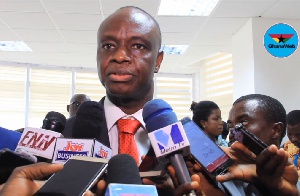 Joe Anokye, Director General, NCA
Joe Anokye, Director General, NCA
The influence of politics on Ghanaians acceptance of the laws of the land and their willingness to comply with those laws was made starkly evident last week when the country’s electronic media industry regulator, the National Communications Authority announced that it was commencing processes to close 49 television stations that are operating without valid licences and the decision was accepted without protest. Previous moves by the regulator in this regard have invariably been met by an uproar, with public policy commentators and leaders of thought protesting what they regularly label, efforts to stifle the media, and by so doing curb free speech and democratic freedoms.
Public policy analysts basically agree that the reason for the widespread acceptance of the NCA’s decisions without protest is simply because the stations identified are not politically affiliated. Rather they are either stations established by religious organizations or stations set up with purely commercial motives.
Actually though the NCA s move is being seen as part of a wider effort to sanitize the industry with regards to content.
It forms part of an exercise to sanitise the media space due to the wanton violation of regulations following an influx of TV operators.
It is instructive that the NCA released a list of offenders barely 24 hours after shutting down Thunder TV and Ice 1 TV, both operated by popular spiritualist Patricia Asiedu, popularly known as Nana Agradaa.
Nana Agradaa, who openly advertises money-doubling rituals dubbed ‘Sika Gari’, was arrested when the security team stormed the premises of her TV stations.
The clampdown of illegal TVs has been scaled up across the country.
Ghana has experienced an explosion of digital TV stations being established over the past couple of years in response to its liberalization of the airwaves. Most of the new stations have been established by religious institutions, rather than political interests thus minimizing the politicalization of the imminent exercise.
Public policy and societal analysts are drawing an interesting conclusion from the ongoing situation by asserting that it evidences that while religious institutions and their members are willing to abide by the law, political parties and their supporters are not. Indeed in the past efforts by the State to call to order media houses that are politically affiliated have resulted in stern criticism of the incumbent government, no matter how clear the infractions have been.
But not so this time as political interests are not being affected and so the political class is not stirring up any controversy.
Indeed the usually outspoken Member of Parliament for Ningo-Prampram, Sam George, says the National Communications Authority (NCA) is within its rights to shut down 49 television channels it says are operating without valid licences.
He says the Authority’s action is justified as long as there is adequate proof that the affected channels were operating illegally.
However, the legislator said the NCA, beyond its statement, will need to provide details of the infractions of each of the channels to ensure fairness and transparency.
“If you have not applied for a license and same [has not been] granted by the NCA, you cannot and should not be broadcasting. If they are broadcasting using spectrum without the requisite registration and license, that is illegal and so the NCA is within its rights to take them off [air]. We can’t have a situation where anybody decides they’ll broadcast whatever they want to broadcast.”
A statement released by the NCA on Wednesday, April 21, 2021, said the channels have breached Electronic Communications Act. In part it read:
“The National Communications Authority (NCA) has embarked on an exercise to shut down 49 Television (TV) stations for operating without Authorisations.
“This forms part of a continuous monitoring exercise conducted on various Satellite Free-to-Air Television platforms using the Broadcast Monitoring System (BMS) and the Radio Spectrum Monitoring System (RSMS). The monitoring revealed that some channels were operating without valid Authorisations, contrary to Section 2(4) of the Electronic Communications Act 775 of 2008.”
It added: “As a result, forty-nine (49) channels have been identified to be operating without valid Authorisations from the Authority and is being shut down accordingly.”
The statement says it will use the police service to enforce its ruling.
In 2019, the NCA took a similar decision against defaulting Frequency Modulation (FM) stations resulting in a shutdown of 57 operators.This was after an audit of all FM stations in the country in 2017. The situation quickly deteriorated into political bickering as two of the stations involved – Radio Gold and Radio XYZ – were primary mouth pieces of the opposition National Democratic Congress.
Initially, fines were imposed on the stations with expired authorisations.
Some of the aggrieved operators filed individual cases, and others did so jointly under the Ghana Independent Broadcasters Association (GIBA) against the NCA at the Electronic Communication Tribunal (ECT).
On June 18, 2018, the ECT set aside the fines but stated that a person with an expired FM radio authorisation must lose the authorisation and re-apply if he or she so wished.
Over 20 of the stations lost their licences, including Radio XYZ and Radio Gold.